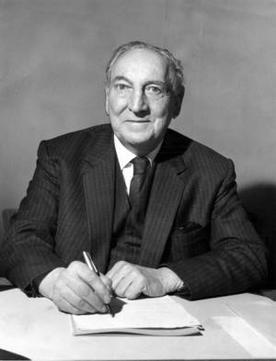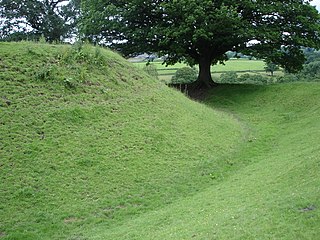100 Welsh Heroes was an opinion poll run in Wales as a response to the BBC's 100 Greatest Britons poll of 2002. It was carried out mainly on the internet, starting on 8 September 2003 and finishing on 23 February 2004. The results were announced on 1 March (St David's Day) 2004 and subsequently published in a book. [1]
The poll was operated by Culturenet Cymru, a Welsh Assembly-funded body based at the National Library of Wales in Aberystwyth. [2] At the time of the results being announced the organisers claimed that the 81,323 nominations and votes made it the largest online poll conducted in Wales.
Former Labour leader Neil Kinnock, himself named in the poll, [3] had, during the voting, drawn attention to a Welsh nationalist "plot" to have Owain Glyndŵr at number one, rather than the eventual winner, Aneurin Bevan. [4] In August 2004 a former employee of Culturenet Cymru alleged that the poll had been rigged to avoid accusations of "dumbing-down", and to ensure that Owain Glyndŵr did not receive more votes than Aneurin Bevan, although these claims were later dismissed by the Welsh Government. [5]
Only nine of the list of a hundred are female, of whom Catherine Zeta-Jones was the most popular, with 1136 votes.
The top 100 were: [6]

Owain ap Gruffydd, commonly known as Owain Glyndŵr or Glyn Dŵr, was a Welsh leader, soldier and military commander in the Late Middle Ages, who led a 15-year-long revolt with the aim of ending English rule in Wales. He was an educated lawyer, forming the first Welsh parliament under his rule, and was the last native-born Welshman to claim the title Prince of Wales.

James (Jeremiah) Griffiths was a Welsh Labour Party politician who served for 34 years as a Member of Parliament (MP). He was a trade union leader and became the first Secretary of State for Wales, serving from 1964 to 1966 under Harold Wilson.

The flag of Wales consists of a red dragon passant on a green and white field. As with many heraldic charges, the exact representation of the dragon is not standardised in law and many renderings exist. It is not represented in the Union Flag.

Machynlleth is a market town, community and electoral ward in Powys, Wales and within the historic boundaries of Montgomeryshire. It is in the Dyfi Valley at the intersection of the A487 and the A489 roads. At the 2001 Census it had a population of 2,147, rising to 2,235 in 2011. It is sometimes referred to colloquially as Mach.

Welsh nationalism emphasises and celebrates the distinctiveness of Welsh culture and Wales as a nation or country. Welsh nationalism may also include calls for further autonomy or self-determination, which includes Welsh devolution, meaning increased powers for the Senedd, or full Welsh independence.
This article is about the particular significance of the year 2003 to Wales and its people.
This article is about the particular significance of the year 2002 to Wales and its people.

The Welsh Dragon is a heraldic symbol that represents Wales and appears on the national flag of Wales.

The Glyndŵr Award is made for an outstanding contribution to the arts in Wales. It is given by the Machynlleth Tabernacle Trust to pre-eminent figures in music, art and literature in rotation. The award takes its name after Owain Glyndŵr, crowned Prince of Wales at Machynlleth in 1404.
Welsh republicanism or republicanism in Wales is the political ideology that advocates for Wales to be governed by a republican system, as opposed to the monarchy of the United Kingdom.
This article is about the particular significance of the year 1959 to Wales and its people.
This article is about the particular significance of the year 1945 to Wales and its people.

Wales in the late Middle Ages spanned the years 1282–1542, beginning with conquest and ending in union. Those years covered the period involving the closure of Welsh medieval royal houses during the late 13th century, and Wales' final ruler of the House of Aberffraw, the Welsh Prince Llywelyn II, also the era of the House of Plantagenet from England, specifically the male line descendants of Geoffrey Plantagenet, Count of Anjou as an ancestor of one of the Angevin kings of England who would go on to form the House of Tudor from England and Wales.
This article is about the particular significance of the decade 1870–1879 to Wales and its people.

Welsh-language literature has been produced continuously since the emergence of Welsh from Brythonic as a distinct language in around the 5th century AD. The earliest Welsh literature was poetry, which was extremely intricate in form from its earliest known examples, a tradition sustained today. Poetry was followed by the first British prose literature in the 11th century. Welsh-language literature has repeatedly played a major part in the self-assertion of Wales and its people. It continues to be held in the highest regard, as evidenced by the size and enthusiasm of the audiences attending the annual National Eisteddfod of Wales, probably the largest amateur arts festival in Europe, which crowns the literary prize winners in a dignified ceremony.
Ieuan is one of several Welsh forms of the male given name John.

"Owain Glyndŵr's Court", also known as "Sycharth" or "The Court of Owain Glyndŵr at Sycharth", is a cywydd by the Welsh bard Iolo Goch. It describes and celebrates the hall and household of his patron, the nobleman Owain Glyndŵr, at Sycharth in Powys. It cannot be dated exactly, but was probably written about 1390, before Glyndŵr's revolt against the English crown. It survives in as many as 24 manuscripts.

A series of Welsh rebellions broke out in the century following the conquest of Wales by Edward I in 1283, which had brought the whole of Wales under the control of the Kingdom of England for the first time. In 1400, Welsh discontent with English rule in Wales culminated in the Welsh Revolt, a major uprising led by Owain Glyndŵr, who achieved de facto control over much of the country in the following years. The rebellion petered out after 1409, and after complete English control was restored in 1415 no further major rebellions occurred.